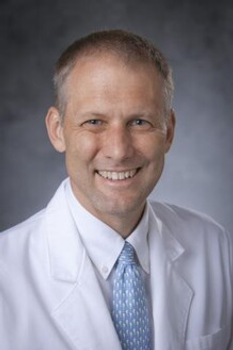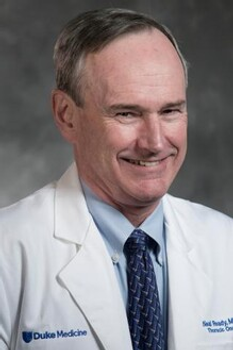Lung Cancer Overview
Learn About Lung Cancer
Lung cancer is cancer that starts in the lungs.
The lungs are located in the chest. When you breathe, air goes through your nose, down your windpipe (trachea), and into the lungs, where it flows through tubes called bronchi. Most lung cancer begins in the cells that line these tubes.
There are two main types of lung cancer:
- Non-small cell lung cancer (NSCLC) is the most common type of lung cancer.
- Small cell lung cancer (SCLC) makes up about 20% of all lung cancer cases.
If the cancer started somewhere else in the body and spreads to the lungs, it is called metastatic cancer to the lung.
Cancer - lung
Common conditions include: Non-Small Cell Lung Cancer (NSCLC), Small Cell Lung Cancer (SCLC)
Lung cancer is the deadliest type of cancer for both men and women. Each year, more people die of lung cancer than of breast, colon, and prostate cancers combined.
Lung cancer is more common in older adults. It is rare in people under age 45.
Smoking causes most cases (around 90%) of lung cancer. The risk depends on the number of cigarettes you smoke each day and for how long you have smoked. Being around the smoke from other people (secondhand smoke) also raises your risk of lung cancer. The risk decreases with time after you stop smoking. But some people who have never smoked do develop lung cancer. There is no evidence that smoking low-tar cigarettes lowers the risk.
Research shows that smoking marijuana may help cancer cells grow. But there is no direct link between smoking marijuana and developing lung cancer.
Constant exposure to high levels of air pollution and drinking water that has a high level of arsenic can increase your risk of lung cancer. A history of radiation therapy to the lungs can also increase risk.
Working with or living near cancer-causing chemicals or materials can also increase the risk of developing lung cancer. Such chemicals include:
- Arsenic
- Asbestos
- Radon
- Chemicals such as uranium, beryllium, vinyl chloride, nickel chromates, coal products, mustard gas, chloromethyl ethers, gasoline, and diesel exhaust
- Certain alloys, paints, pigments, and preservatives
- Products using chloride and formaldehyde
Early lung cancer may not cause any symptoms.
Symptoms depend on the type of cancer you have, but may include:
- Chest pain
- Cough that does not go away
- Coughing up blood
- Fatigue
- Losing weight without trying
- Loss of appetite
- Shortness of breath
- Wheezing
Other symptoms that may also occur with lung cancer, often in the late stages:
- Bone pain or tenderness
- Eyelid drooping
- Facial paralysis
- Hoarseness or changing voice
- Joint pain
- Nail problems
- Shoulder pain
- Swallowing difficulty
- Swelling of the face or arms
- Weakness
These symptoms can also be due to other, less serious conditions, so it is important to talk to your health care provider.
Treatment for lung cancer depends on the type of cancer, how advanced it is, and how healthy you are:
- Surgery to remove the tumor may be done when it has not spread beyond nearby lymph nodes.
- Chemotherapy, immunotherapy, and targeted therapy use medicines to kill cancer cells and stop new cells from growing.
- Radiation therapy uses powerful x-rays or other forms of radiation to kill cancer cells.
The above treatments may be done alone or in combination. Your provider can tell you more about the specific treatment you will receive, depending on the specific type of lung cancer and what stage it is.
Duke Cancer Center
Thomas Stinchcombe is an Oncologist and a Hematologist Oncology provider in Durham, North Carolina. Dr. Stinchcombe is rated as an Elite provider by MediFind in the treatment of Lung Cancer. His top areas of expertise are Non-Small Cell Lung Cancer (NSCLC), Lung Cancer, Small Cell Lung Cancer (SCLC), EGFR Positive Lung Cancer, and Gamma Knife Radiosurgery. Dr. Stinchcombe is currently accepting new patients.
Duke Cancer Center
Neal Ready is an Otolaryngologist in Durham, North Carolina. Dr. Ready is rated as an Elite provider by MediFind in the treatment of Lung Cancer. His top areas of expertise are Lung Cancer, ALK-Positive Non-Small Cell Lung Cancer, Laryngeal Cancer, and Throat Cancer. Dr. Ready is currently accepting new patients.
City Of Hope Medical Foundation
Dan Raz is a Thoracic Surgeon and an Interventional Radiologist in South Pasadena, California. Dr. Raz is rated as an Elite provider by MediFind in the treatment of Lung Cancer. His top areas of expertise are Lung Cancer, Non-Small Cell Lung Cancer (NSCLC), Lung Adenocarcinoma, Thymectomy, and Endoscopy.
You can ease the stress of illness by joining a cancer support group. Sharing with others who have common experiences and problems can help you not feel alone.
How well you do depends on how much the lung cancer has spread and whether the cancer cells have certain genetic changes that create target molecules in or on the cells.
Contact your provider if you have symptoms of lung cancer, particularly if you smoke.
If you smoke, now is the time to quit. If you are having trouble quitting, talk with your provider. There are many methods to help you quit, from support groups to prescription medicines. Also, try to avoid secondhand smoke.
If you are age 50 to 80 years and have a 20 pack-year smoking history and currently smoke or have quit within the past 15 years, ask your provider about being screened for lung cancer by low-dose CT scan of your chest.
Summary: This phase I trial tests the safety, side effects, and best dose of tazemetostat in combination with topotecan and pembrolizumab in treating patients with small cell lung cancer that has come back after a period of improvement (recurrent). Tazemetostat may stop the growth of tumor cells by blocking some of the enzymes needed for cell growth. Chemotherapy drugs, such as topotecan, work in different...
Summary: This is a trial to evaluate the efficacy, safety, and tolerability of adagrasib plus pembrolizumab plus platinum-doublet chemotherapy versus placebo plus pembrolizumab plus platinum-doublet chemotherapy in participants with previously untreated, locally advanced or metastatic NSCLC with KRAS G12C mutation
Published Date: March 31, 2024
Published By: Todd Gersten, MD, Hematology/Oncology, Florida Cancer Specialists & Research Institute, Wellington, FL. Review provided by VeriMed Healthcare Network. Also reviewed by David C. Dugdale, MD, Medical Director, Brenda Conaway, Editorial Director, and the A.D.A.M. Editorial team.
American Cancer Society website. Key statistics for lung cancer. www.cancer.org/cancer/types/lung-cancer/about/key-statistics.html. Updated January 29, 2024. Accessed June 3, 2024.
American Lung Association website. Lung cancer trends brief. www.lung.org/research/trends-in-lung-disease/lung-cancer-trends-brief. Accessed June 3, 2024.
Araujo LH, Horn L, Merritt RE, Shilo K, Xu-Welliver M, Carbone DP. Cancer of the lung: non-small cell lung cancer and small cell lung cancer. In: Niederhuber JE, Armitage JO, Kastan MB, Doroshow JH, Tepper JE, eds. Abeloff's Clinical Oncology. 6th ed. Philadelphia, PA: Elsevier; 2020:chap 69.
Centers for Disease Control and Prevention website. Health problems caused by secondhand smoke. www.cdc.gov/tobacco/secondhand-smoke/health.html. Updated May 15, 2024. Accessed June 3, 2024.
National Cancer Institute website. Non-small cell lung cancer treatment (PDQ) - health professional version. www.cancer.gov/types/lung/hp/non-small-cell-lung-treatment-pdq. Updated March 8, 2024. Accessed June 3, 2024.
National Cancer Institute website. Small cell lung cancer treatment (PDQ) - health professional version. www.cancer.gov/types/lung/hp/small-cell-lung-treatment-pdq. Updated May 23, 2024. Accessed June 3, 2024.
Pastis NJ, Gonzalez AV, Silvestri GA. Lung cancer: diagnosis and staging. In: Broaddus VC, Ernst JD, King TE, et al, eds. Murray and Nadel's Textbook of Respiratory Medicine. 7th ed. Philadelphia, PA: Elsevier; 2022:chap 76.
US Preventive Services Task Force website. Final recommendation statement: Lung cancer screening. www.uspreventiveservicestaskforce.org/uspstf/recommendation/lung-cancer-screening. Released March 9, 2021. Accessed June 3, 2024.


